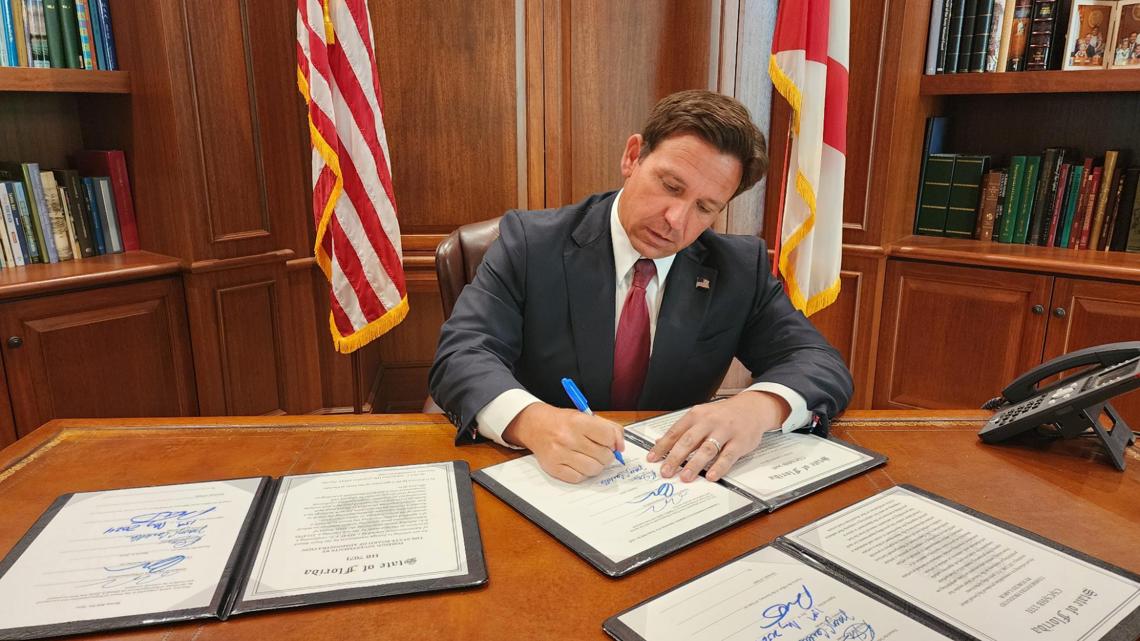Florida Governor Ron DeSantis signed a new bill on Wednesday aimed at improving the safety of children and parents during custody exchanges.
The bill, known as HB 385, or the “Safe Exchange of Minor Children” law, introduces several measures to ensure that these exchanges occur in secure environments, reducing the risk of harm to all parties involved.
Key Provisions of HB 385
HB 385 requires parents who share custody to develop a court-approved parenting plan. This plan must outline the daily responsibilities of raising the child and include time-sharing schedule arrangements.
It also designates which parent is responsible for critical matters such as healthcare, education, and extracurricular activities. These measures are designed to provide a clear framework that both parents must follow, reducing potential conflicts.
In situations where the court identifies a “risk or an imminent threat of harm” to either the parents or the child, the new law mandates that the child be exchanged at a “neutral, safe exchange” location. This is a crucial step in preventing potentially dangerous encounters.
Designation of Safe Exchange Locations
One of the standout features of HB 385 is the requirement for Florida sheriffs to designate at least one parking lot at the sheriff’s office or a substation to serve as a neutral, safe exchange location. These locations must meet specific safety criteria to ensure the security of the children and parents involved.
The designated safe exchange parking lots must have a purple light or a sign that clearly identifies them as such. They must be accessible 24 hours a day, seven days a week, providing convenience for parents who may need to arrange exchanges outside of typical business hours.
Additionally, these locations must have adequate lighting and be equipped with an external video surveillance system that records continuously. At least one camera must be positioned to record the area around the purple light or sign, ensuring comprehensive coverage.
The Cassie Carli Law
HB 385 is also referred to as the “Cassie Carli” law, named in memory of a Florida mother who disappeared in 2022 after meeting the father of her child for a timeshare exchange.
Tragically, Cassie Carli was later found buried in a shallow grave in Alabama. Her case highlighted the dangers that can arise during custody exchanges, prompting legislative action.
Marcus Spanevelo, the father of Carli’s child, was later indicted on a charge of kidnapping resulting in her death. The passage of this law aims to prevent similar tragedies by providing safer environments for custody exchanges.

Legislative Support and Implementation
The bill received overwhelming support in the Florida Senate and House, passing nearly unanimously. Governor DeSantis officially signed HB 385 into law on Wednesday, and it is set to go into effect on July 1.
By requiring court-approved parenting plans and the designation of safe exchange locations, HB 385 addresses the critical need for secure environments during custody exchanges. This legislation represents a significant step forward in protecting both children and parents from potential harm.
Implications for Florida Families
For families in Florida, HB 385 offers a new layer of security and peace of mind. The requirement for a detailed parenting plan ensures that both parents have a clear understanding of their responsibilities and time-sharing arrangements. This clarity can help reduce disputes and provide a more stable environment for children.
The establishment of safe exchange locations is particularly important in cases where there may be a history of conflict or a risk of harm.
By providing a neutral, well-monitored setting for exchanges, the law aims to minimize the potential for dangerous encounters. These locations, with their continuous video surveillance and clear identification, offer a safer alternative to meeting in unmonitored public or private spaces.
Addressing Broader Safety Concerns
HB 385 also serves as a reminder of the broader safety concerns associated with custody exchanges. While not all exchanges pose a risk, the law acknowledges that certain situations require additional precautions.
By mandating safe exchange locations, the law proactively addresses these concerns and provides a structured solution.
The continuous recording at these locations ensures that there is always a record of the exchange, which can be crucial in resolving any disputes or allegations that may arise. This level of monitoring can act as a deterrent to potential misconduct, knowing that the interaction is being recorded and can be reviewed if necessary.
A Tribute to Cassie Carli
Naming the law after Cassie Carli serves as a poignant reminder of the tragic circumstances that can arise from unsafe custody exchanges. It underscores the importance of taking proactive measures to protect parents and children.
The law not only aims to prevent such tragedies but also honors the memory of Cassie Carli by striving to ensure that no other family has to endure a similar loss.
Looking Forward
As HB 385 goes into effect, it will be important to monitor its implementation and effectiveness. The requirement for sheriffs to designate safe exchange locations is a significant step, but ensuring these locations meet all safety criteria will be crucial.
Ongoing training and resources for law enforcement and court officials will also be necessary to support the successful implementation of this law.
For Florida families, the law represents a commitment to safety and a recognition of the challenges that can arise during custody exchanges. By providing clear guidelines and safe locations, HB 385 aims to create a more secure environment for all involved, ultimately prioritizing the well-being of children.
Conclusion
Governor DeSantis’s signing of the ‘Safe Exchange’ child custody bill marks a significant milestone in improving the safety of custody exchanges in Florida.
HB 385 introduces essential measures to protect children and parents, including the requirement for court-approved parenting plans and the designation of safe exchange locations.
Named in memory of Cassie Carli, the law addresses the critical need for secure environments during these exchanges, aiming to prevent tragedies and ensure the safety of all parties involved.
Read more news:
